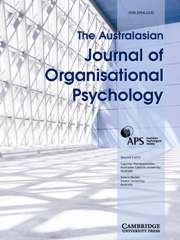Crossref Citations
This article has been cited by the following publications. This list is generated based on data provided by
Crossref.
Chen, Yang
Li, Shuang
Xia, Qing
and
He, Chao
2017.
The Relationship between Job Demands and Employees’ Counterproductive Work Behaviors: The Mediating Effect of Psychological Detachment and Job Anxiety.
Frontiers in Psychology,
Vol. 8,
Issue. ,
Lee, Dohyun
2019.
The convergent, discriminant, and nomological validity of the Depression Anxiety Stress Scales-21 (DASS-21).
Journal of Affective Disorders,
Vol. 259,
Issue. ,
p.
136.
Jiang, Shan
Ren, Qiang
Jiang, Chaoxin
and
Wang, Lin
2021.
Academic stress and depression of Chinese adolescents in junior high schools: Moderated mediation model of school burnout and self-esteem.
Journal of Affective Disorders,
Vol. 295,
Issue. ,
p.
384.
Windon, Suzanna
and
Robotham, Daniel
2021.
The relationship between farmers’ quality of life and their leadership competencies.
Advancements in Agricultural Development,
Vol. 2,
Issue. 2,
p.
50.
Ali, Muhammad Sadil
Ali, Muhammad Nadil
and
Mahmood Bagram, Muhammad Majid
2021.
Financial Literacy and Financial Satisfaction: A Moderated Mediation Analysis of Self-Esteem and Financial Behavior.
JISR management and social sciences & economics,
Vol. 19,
Issue. 1,
p.
67.
Shaygan, Maryam
and
Yazdanpanah, Maryam
2022.
Depression and work–family conflict mediating the effects of job stress on chronic pain: a structural equation modelling approach.
International Journal of Occupational Safety and Ergonomics,
Vol. 28,
Issue. 4,
p.
2551.
Xiao, Yuting
Zhang, Honghui
Li, Qian
Xiao, Shan
Dai, Ting
Guo, Jia
and
Yu, Yu
2022.
Role Stress and Psychological Distress Among Chinese Nurses During the COVID-19 Pandemic: A Moderated Mediation Model of Social Support and Burnout.
Frontiers in Psychiatry,
Vol. 13,
Issue. ,
Lim, Tommy
Thompson, Jason
Tian, Leimin
and
Beck, Ben
2023.
A transactional model of stress and coping applied to cyclist subjective experiences.
Transportation Research Part F: Traffic Psychology and Behaviour,
Vol. 96,
Issue. ,
p.
155.
Luo, Yu
He, Xiangcai
Zhou, Jiarong
Zhang, Yu
Ma, Xinxin
and
Zou, Weixing
2023.
Internet altruistic behavior and self-consistency and congruence among college students: A moderated mediation model of self-efficacy and self-esteem.
Current Psychology,
Vol. 42,
Issue. 6,
p.
4830.
2023.
Refocusing Academic Libraries Through Learning and Discourse.
p.
119.
Bolin, Mary K.
2023.
Refocusing Academic Libraries Through Learning and Discourse.
p.
55.
Wang, Hui
and
Li, Yan
2024.
Academic researchers’ work stress and work engagement: Hindrance stress appraisal mediation and psychological resilience moderation.
Journal of Psychology in Africa,
Vol. 34,
Issue. 5,
p.
586.
Hao, Shuwei
Zhang, Xueting
and
Xu, Honghong
2024.
Insecure Parental Attachment and Anxiety in Vocational College Students: The Mediating Role of Subjective Well-Being and the Moderating Role of Self-Esteem.
Psychology Research and Behavior Management,
Vol. Volume 17,
Issue. ,
p.
1221.
Wallner, Günter
Johry, Aakash
van Wijland, Marnix
Bernhaupt, Regina
and
Kriglstein, Simone
2025.
Play, watch, analyze, repeat: How do players develop competitive gaming skills?.
Entertainment Computing,
Vol. 52,
Issue. ,
p.
100908.


